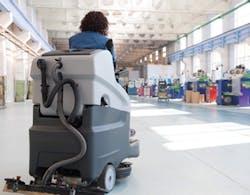Proponents of daytime cleaning often cite the financial benefits as the chief driver behind their decision to reschedule cleaning services, and for good reason. Bringing in a cleaning team while your building is already occupied means your lighting and HVAC systems don't have to waste energy for a night cleaning shift.
"A lot of the savings come from utilities and not having to turn things on at night," notes Anthony Trombetta, head of membership services for ISSA, a professional organization for the cleaning industry. "If you're in a 5,000-square-foot building, that might not make much of a difference. But for a 50,000- or 5 million-square-foot facility, turning on the heat and lights for a few extra hours really adds up."
Is your facility a good candidate for day cleaning?
Potential Perks
Before you make the switch, carefully weigh the potential pros and cons of moving some of your cleaning services to the daytime. Beyond the utility savings, organizations that utilize day cleaning typically cite three other perks that improve occupant comfort.
Productivity: This tends to improve for both the cleaning crew and regular building occupants. When the two groups can see each other, both are more likely to focus on work due to an increased feeling of being supervised, Trombetta says.
Personal stake: Typically, building occupants and night-shift cleaners have few chances to interact. Having both groups in the building at the same time encourages relationship-building and feedback, says Karla Leis, vice president of GM Orbio Technologies, which develops sustainable water-based cleaning technologies.
"If building occupants can see people cleaning, they know it's being done and it makes them feel better about it," explains Leis. "If there are issues or people aren't satisfied, they can actually talk to the cleaner directly. There are usually fewer complaints because people get to know the staff."
Image enhancement: Daytime crews can respond more quickly to cleaning emergencies or higher-than-usual demand to keep facilities looking fresh, Leis notes. "If there's a spill or another issue, they can take care of it right away instead of having to wait until the night shift," Leis says. "Full trash cans and restrooms are the areas where the biggest benefits can be seen – they can be cleaned throughout the day instead of having them look beautiful at the beginning of the day but messy by the end."
Cleaning Options to Fit Any Facility
However, not every facility is a good candidate. Objections to day cleaning typically revolve around noise, sensitivity of information, or an already high population where bringing in cleaning personnel would just create excessive traffic, Trombetta explains. The cleaners also need access to the surfaces they're expected to clean – if that includes desk surfaces, it could be tough to finish cleaning if the desk is occupied.
"Office buildings, schools, and hospitals where patients want to sleep at night are good candidates for day cleaning," says Leis. "Generally, the quiet, unobtrusive tasks like emptying trash in common areas, cleaning windows, dusting, and refreshing restrooms can be done during the day with minimal impact on building occupants."
If switching all of your cleaning tasks to daytime isn't feasible, consider a hybrid cleaning schedule. You can still reap some of day cleaning's energy savings by just minimizing the amount of nighttime work.
"During the day, for example, you may want to do just porter service or other less disruptive tasks," Trombetta says. "At night, you might do the heavy cleaning with machines, like running an autoscrubber on hard floors, vacuuming large areas, or stripping and waxing."
Facilities where no amount of daytime service will work should consider a team cleaning agreement, McCann adds. Instead of leaving the whole building on for the entire nighttime shift, team cleaning coordinates all cleaning personnel to
focus on one floor at once and move to the next as each floor is completed. This way, only one floor at a time requires lights and temperature regulation.
Considerations for Cleaning Agreements
Regardless of the amount of cleaning you schedule during daytime hours,
periodic (and noisy) deep cleaning will still be necessary. When you renegotiate your agreement with your service
provider, it's important to address this and other potentially disruptive tasks.
"If your cleaning crew needs to deep-scrub restroom floors with a heavy buffer, how do you handle those things? Do you set aside a couple of nights here and there, or do you close off bathrooms during part of the day?" McCann asks. "Items like that are a challenge unless you have quarterly or monthly nights to take care of deep-cleaning."
Ask your contractor about previous experience with clients' day cleaning programs and weigh the risks and rewards of rescheduling cleanup tasks, Trombetta recommends. Finally, update your scope of work to reflect which shifts you'd like to switch to and services you expect.
"If you have a specification for area or zone cleaning, which most contracts do, you'd want that rewritten," Trombetta says. "The contractor can do that or you can ask ISSA to help. It tells the cleaning company what needs to be done, when it should be done, and how often."
With a newly revised contract in place, you're left to walk occupants through the change. Trombetta recommends prepping for the transition early and often.
"Overcommunicate the change," says Trombetta. "Starting as much as 30 days in advance, let building occupants know what you're changing and why. Then give them time to adjust and come up with a system for feedback so that if they do have recommendations, comments, or complaints, there's a way to handle them."
Janelle Penny is senior editor of BUILDINGS.
About the Author
Janelle Penny
Editor-in-Chief at BUILDINGS
Janelle Penny has been with BUILDINGS since 2010. She is a two-time FOLIO: Eddie award winner who aims to deliver practical, actionable content for building owners and facilities professionals.

